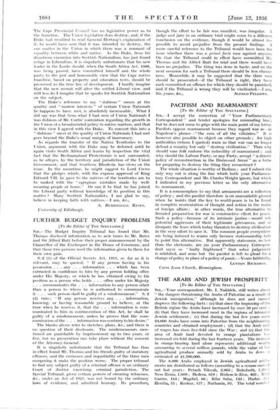FURTHER BUDGET INQUIRY PROBLEMS [To the Editor of THE SPECTATOR.]
SIII,—The Budget Inquiry Tribunal has found that Mr. Thomas disclosed inforMation as to new taxes to Mr. Bates and Sir Alfred Butt before their proper announcement by the Chancellor of the Exchequer in the House of Commons; and that those two petsbria used the infoimation given to them for their own gain.
S.'2 (1) of the Official Secrets Act, 1911, so far as it is relevant, may be quoted. " If any person having in his possession . . . any . . . information . . . which has been entrusted, in .confidence :to him by any person holding office under His Majesty, or which he has obtained owing to his position as a person who holds . . . office under his Majesty . . . communicates the . . . information to any person other than a person to whom he is authorised to communicate it . . . such person shall be guilty of a misdemeanour." S. 2 (2) runs : "If any person receives any . . . information, knowing, or having reasonable ground to believe, at the time when he receives it, that the . . . information is com- municated to him in contravention of this Act, he shall be guilty of a misdemeanour, unless he proves that the 'com- munication of the . . . information was contrary to his desire."
The blanks above refer to sketches, plans, &c., and there is no question of their disclosure. The misdemeanours men- tioned are punishable by imprisonment up to two years, or five, but no prosecution can take place without the consent of the Attorney-General.
It is singularly unfortunate that the Tribunal has thus in effect found Mr.. Thomas and his friends guilty of statutory offences, and the eminence and impartiality of the three men composing it make the position worse. The proper tribunal to find any subject guilty of a criminal offence is an ordinary Court of Justice exercising criminal jurisdiction. The Special Tribunal, given certain powers of swearing witnesses, &c., under an Act of 1921, was not bound by the ordinary laws of evidence, and admitted hearsay. Its procedure,
though the effort to be fair was manifest, was irregular. A judge and jury in an ordinary trial might come to a different conclusion on the evidence, though it would be almost im- possible to avoid prejudice from the present findings. A more careful reference to the Tribunal would have been the issue whether there was a prinid fade case against anyone. On that the Tribunal could in effect have committed Mr. Thomas and Sir Alfred Butt for trial and there would have been no prejudice. The thing was done in haste, and on the next occasion for such a Tribunal there should be less clumsi- ness. Meanwhile, it may be suggested that the three men should be prosecuted—if the Tribunal is right, they have each committed an offence for which they should be punished, and if the Tribunal is wrong they will be vindicated.—I am,






















































 Previous page
Previous page